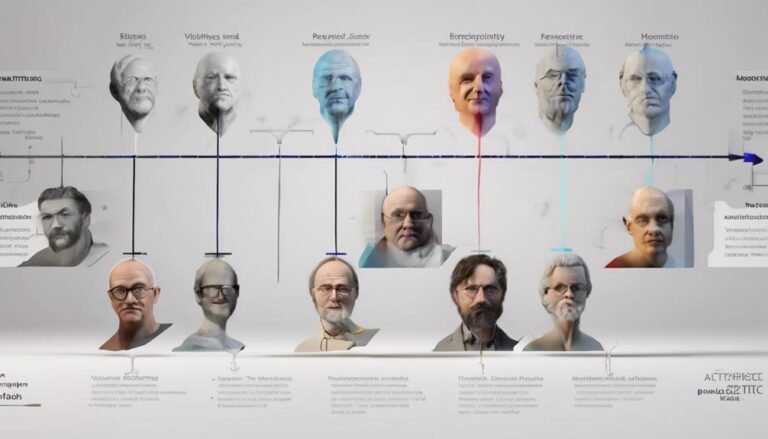Rogers’ Self-Actualization Theory: An Overview
Imagine a scenario where an individual undergoes a transformative journey of self-discovery, embracing their true identity and potential. This journey is at the core of Carl Rogers' Self-Actualization Theory, which explores the profound impact of self-awareness and personal growth on one's well-being. As you begin to explore the facets of this theory, you'll uncover how aligning your self-concept with your authentic self can lead to a deeper understanding of your inner world and pave the way for a more fulfilling life.
Key Takeaways
- Self-actualization is innate for personal fulfillment.
- Alignment of self-concept leads to authenticity.
- Supportive environments nurture personal growth.
- Self-awareness and autonomy foster potential realization.
- Rogers' client-centered therapy empowers self-exploration.
Carl Rogers: The Visionary Psychologist
Examining Carl Rogers' contributions to psychology reveals a pioneering figure who revolutionized the field with his innovative approach to humanistic therapy. Rogers, a visionary thinker, introduced a revolutionary approach to therapy that focused on the client's subjective experience and innate drive towards self-actualization. Unlike the prevalent psychoanalytic and behaviorist perspectives of his time, Rogers emphasized the importance of empathy, unconditional positive regard, and genuineness in the therapeutic relationship.
Rogers' revolutionary approach, known as client-centered therapy, shifted the focus from the therapist as an expert to the client as the expert of their own experiences. This approach empowered individuals to explore their feelings, thoughts, and behaviors in a non-judgmental and supportive environment, leading to greater self-awareness and personal growth.
Core Tenets of Self-Actualization Theory
Carl Rogers' client-centered therapy is grounded in several core tenets that form the basis of his Self-Actualization Theory. At the heart of this theory lies the concept of the self-actualization process, which is the innate tendency of individuals to pursue towards realizing their full potential and achieving a sense of individual fulfillment.
According to Rogers, self-actualization occurs when individuals align their self-concept with their true feelings and desires, leading to a state of congruence and authenticity. Central to Rogers' theory is the belief that every individual has the capacity for personal growth and self-improvement. He emphasized the importance of creating an environment conducive to fostering this growth, characterized by empathy, genuineness, and unconditional positive regard.
Through this supportive environment, individuals can initiate on a journey of self-discovery, overcoming obstacles and developing a deeper understanding of themselves. Rogers' Self-Actualization Theory underscores the significance of self-awareness, self-acceptance, and personal autonomy in achieving a state of fulfillment and realizing one's true potential.
Human Potential and Personal Growth
Exploring the inherent capacity for growth and development in individuals is integral to understanding the concept of human potential and personal growth within Rogers' Self-Actualization Theory.
Individual potential refers to the unique capabilities and resources that each person possesses, which can be actualized through personal development. This theory emphasizes the importance of recognizing and nurturing these inherent qualities to facilitate personal growth and fulfillment.
Personal development, a central focus of Rogers' theory, involves the continuous process of self-improvement and self-discovery. It encompasses activities and practices that enhance self-awareness, self-esteem, and overall well-being.
By engaging in activities that promote personal development, individuals can tap into their full potential and work towards self-actualization.
Understanding human potential and personal growth within the framework of Rogers' theory underscores the significance of self-directed growth and the role of supportive environments in fostering individual development.
Authenticity and Self-Discovery
An essential aspect within Rogers' Self-Actualization Theory is the emphasis on fostering authenticity and self-discovery as key components of personal growth. Authenticity refers to being true to oneself, aligning actions with values and beliefs, and expressing genuine emotions.
Self-discovery involves undertaking an inner journey of exploration and reflection to gain insight into one's thoughts, feelings, and desires. By engaging in self-reflection, individuals can deepen their understanding of themselves, identify areas for personal development, and enhance their overall well-being.
Self-reflection allows you to examine your beliefs, motivations, and behaviors, leading to increased self-awareness and personal growth. Through this introspective process, you can uncover hidden aspects of your identity, confront internal conflicts, and cultivate a more authentic way of living.
The inner journey of self-discovery isn't always easy, as it may involve facing uncomfortable truths or challenging long-held beliefs. However, by embracing this process with openness and curiosity, you can reveal new possibilities for self-improvement and genuine self-expression.
Implications for Well-Being
Embracing authenticity and engaging in self-discovery according to Rogers' Self-Actualization Theory can have profound implications for individual well-being. By prioritizing these aspects, individuals can experience significant improvements in their mental health. When individuals align their actions with their true selves and values, it can lead to decreased levels of stress, anxiety, and depression. This authenticity fosters a sense of inner peace and contentment, contributing to enhanced mental well-being.
Furthermore, embracing self-actualization can also positively impact life satisfaction. When individuals are true to themselves and pursue personal growth, they often find a greater sense of purpose and fulfillment. This sense of purpose can lead to increased overall satisfaction with life, as individuals feel more connected to their authentic selves and the world around them.
Conclusion
To sum up, Carl Rogers' Self-Actualization Theory offers a powerful framework for individuals to explore their inner selves, align their self-concept with their true self, and realize their unique potential.
By fostering authenticity, self-acceptance, and autonomy, this approach promotes personal growth and well-being.
Embracing Rogers' vision can lead to a deeper sense of purpose in life and a greater fulfillment of one's human potential.
Ultimately, self-actualization is a journey towards self-discovery and personal transformation.







